So you watched the Super Bowl. You saw the game, you saw Beyonce shake it, you saw the lights go out and, among the flashy messages, the advertisements for M&Ms and beer and phones and underwear and cologne, you saw this:
Another ad for another product, yes. But one that had a message attached to it that has sent my world into a humming since it aired.
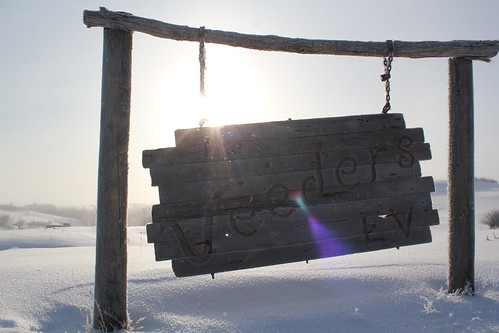
Now it?s possible you missed it. It?s possible you didn?t hear it tucked in there among the baby Clydesdale and the elderly escaping the nursing home for a night at Taco Bell. ?It didn?t make the top ten commercials and didn?t get nearly as much buzz in other parts of the country, but it sure is buzzing here.
I don?t usually comment on pop culture or what ?s happening on T.V. or in sports here because I?ve made it my mission to talk about different things: the way the sun shines on the back of a horse, how the wind blows snow across the prairie and what it?s like to be a woman connected to a place, but as a girl who grew up feeding cattle alongside her father in the coldest winter nights, someone who watched him doctor horses, bring new-born and frozen calves into the basement of the house and nurse them back to life, as a former FFA president and the 4th generation on my family?s ranch, I have to talk about this.
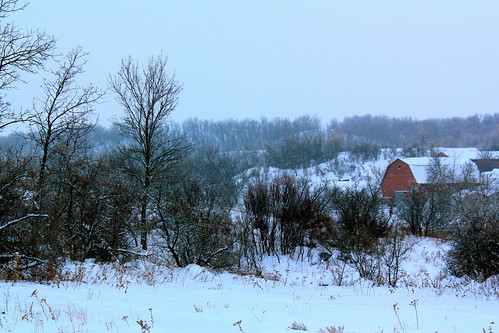
I have to tell you why people like me have been so inclined to share this advertisement, to watch it over and over again, to shout its praises from the rooftops and, well, post it on every social media networking site they can link up to out here in the boonies.
Because finally, among the hype of sports, the glitzy glam of pop culture, the humor and the ruckus and the fight to be the winner, right there in the most prime real-estate of prime-time television someone out there felt it might be important enough to slow it down and tell our story.
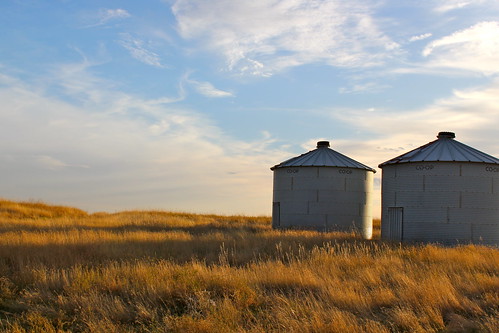
Now, I wasn?t at every Super Bowl party in middle America during the 2.5 minutes Paul Harvey?s message was pumped into millions of homes across the country, but I was at one, and as soon as that familiar voice spoke the first word, the room fell silent.
We held our breath in that moment we were certain we were looking at an image from our backyards: a black baldie cow near a barbed wire fence in a barren, snow-covered prairie.

We were quiet because we saw our church standing tall and worn beside a country road,

we saw our grandfather with callused hands and a face wrinkled and weathered from the long days spent in the elements.

We shushed our voices and choked back a tear for the colt our father couldn?t save, laughed a little because we?ve ridden a horse using a head stall made out of hay wire and smiled at the memory of our father?s stopping the tractor to move a nest of newborn rabbits out of harm?s way.
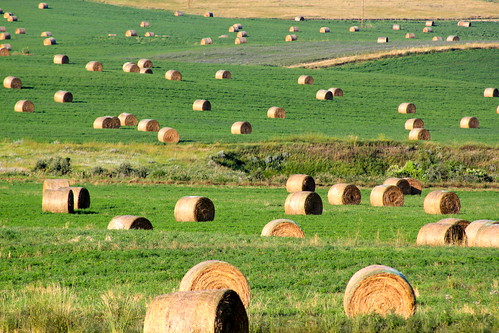
We saw ourselves standing in those fields, our grandmother?s eyes under that hat, our mother holding our hand, our father holding on hope.
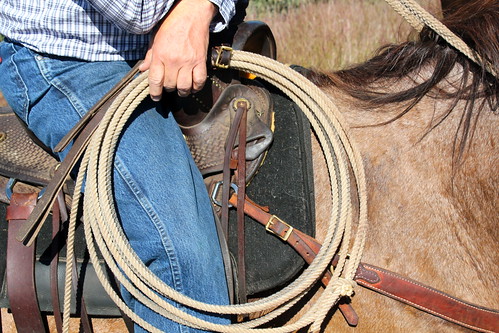
We saw our children in the steady cadence of comforting words and a familiar voice that we?ve heard coming through the static on our old tractor radio for years.
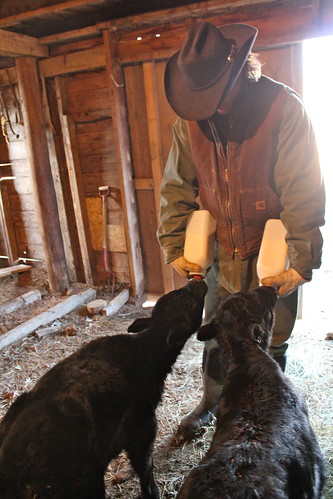
The rest of the story.

Our story.

Some days I feel like we?re moving further and further from our connection to the land and the understanding of the dirt from which that potato was plowed. Farmers, ranchers and agriculturalists are not known to stand at the pulpit and tell their stories to the masses. No. Many spend long days working alone in the combine, on the back of a horse checking cattle or working fencing pliers in the deep brush.We share our stories by living them alongside our elders, hoping to learn something, dreaming that one day we might be fortunate enough to try our hand at tending the land.
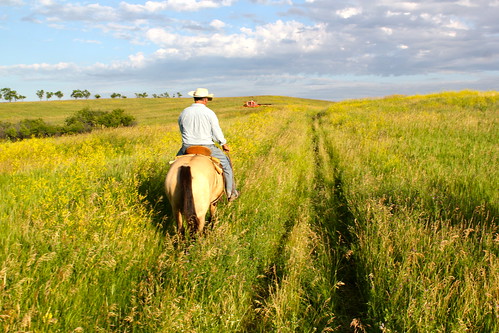
I know my grandfather?s story. I see the old equipment that couldn?t be repaired breaking the wind from the hilltops on this place. I find little pieces of wire, old engines, scraps of leather, worn coveralls and other little pieces of a life spent scraping and saving and getting by in the old out buildings, in the 100 year old barn, in the fences that need to be repaired. My father keeps the same collection, adding to it at will in case he might need to patch something up.

I know my father? s story. I know that?on Sunday mornings he will knock on the door of my house like he does every weekend for a cup of coffee and a chat between chores. ?I know he will take off his boots, un-do his silk scarf and leave his wool cap on his head. I know he will keep his Carhart jacket on because he won?t stay long, just long enough to wonder out loud what might be wrong with the old tractor this time and discuss some plans about buying cattle, fixing the corrals in the spring and making things work better out here.
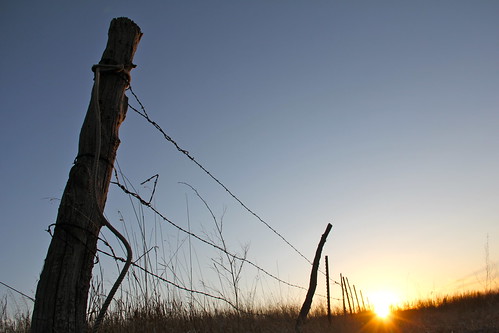
I know that tractor?s story. It?s been on this place for decades, bought used when my father left for college in the 70s. I know the only thing wrong with that tractor is that you can?t stop time, and we could not afford to buy a new one.
Each day my father has been the caretaker of the family?s ranch it has been an adventure to get that tractor up and running.
Every day it has been worth it.
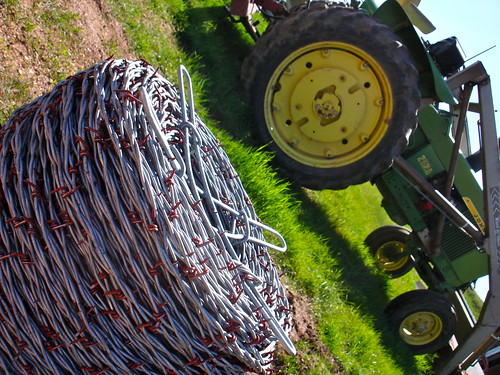
Somewhere along the line a company like Dodge took notice of the kinds of people buying those trucks they were selling, not for the paint job or the heated seat, but for the horsepower and the muscle that it takes to haul a trailer full of bulls to the sale barn, a couple of priceless horses and a teenage daughter to her first high school rodeo, or through a snowy trail as your grandfather scoops grain for the cattle in the winter.
Somewhere in their marketing plan Dodge thought it ?might be a good idea to mention those farmers and ranchers out there throwing bales and feeding the country, because quite frankly, they have helped keep them in business.

So they declared it the ?Year of the Farmer? and are working their marketing plan so that spreading the word means supporting the FFA.

That moment a company like Dodge took to tell our story while they had the world?s attention gave us?the farmers, the ranchers, the corn growers, bottle feeders, chicken-coop?cleaners, post-hole-diggers, pig-sloppers, 5 a.m. cow milkers, ?a little reminder that ours might not be a glamorous story, but it is one worth living.

Click here to watch an interview with the Montana ranchers featured in the commercial.
Source: http://veederranch.com/2013/02/05/farmers-at-the-super-bowl/
winning numbers mega millions megamillions drawing olbermann mega millions march 30 lucky numbers odds of winning mega millions mary mary
No comments:
Post a Comment